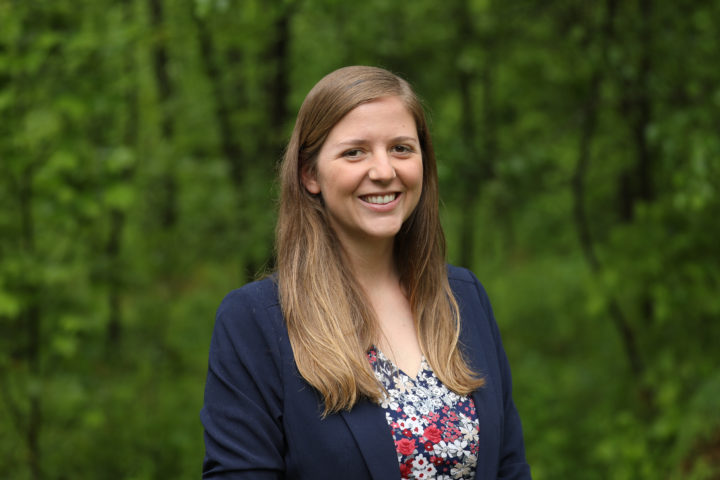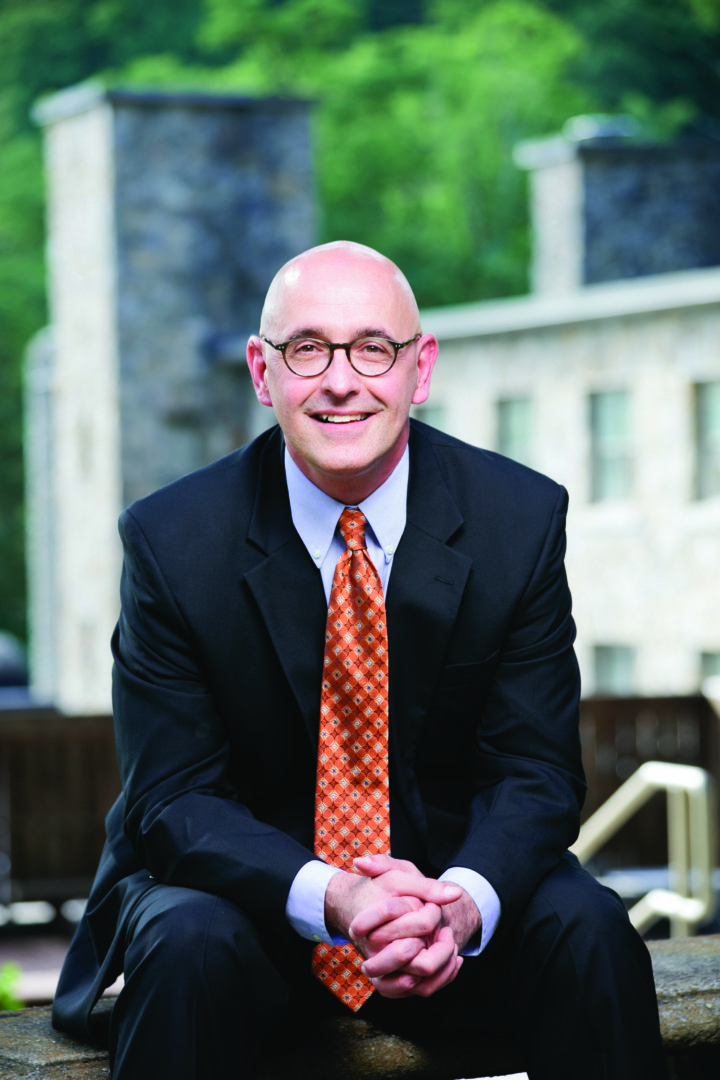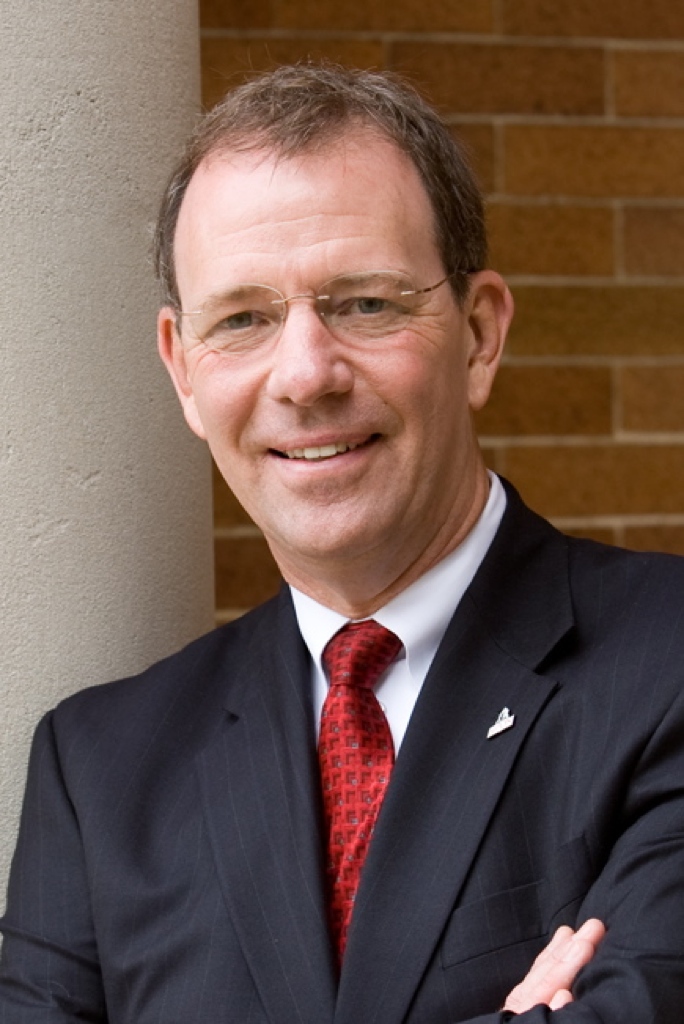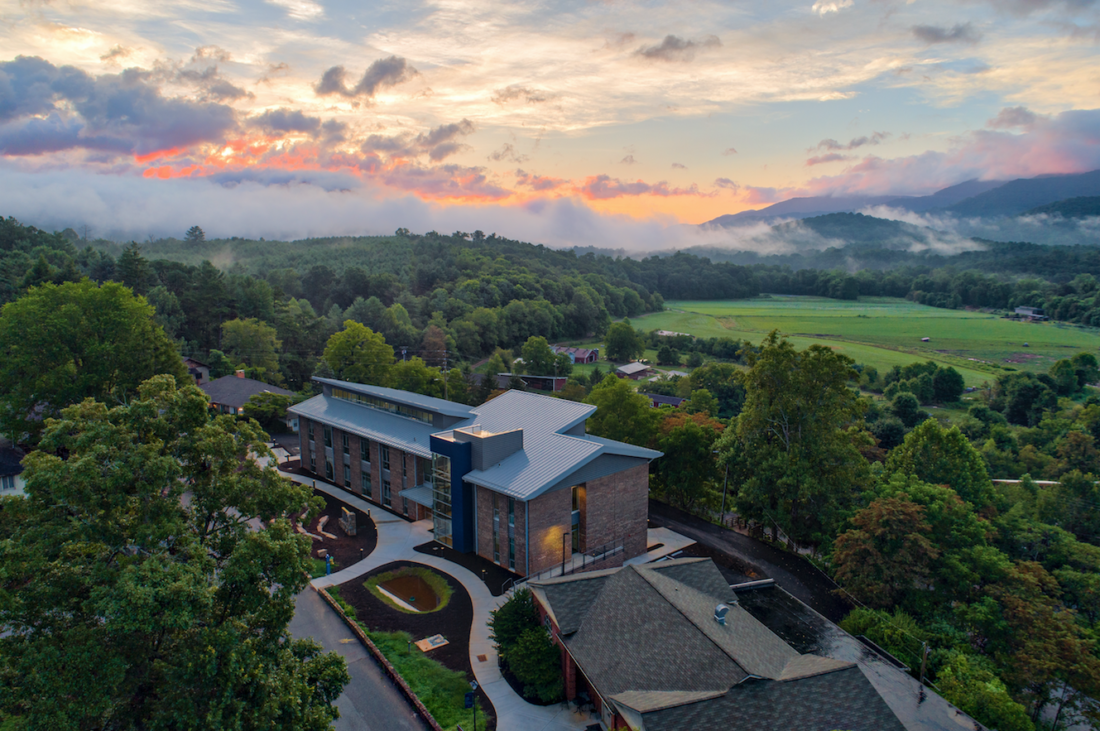Like many, David Joyce is working from home these days. But when your home is the president’s house on the Brevard College campus, you’re never that far away from the office. Still, Joyce has opted to shelter in place as a symbolic gesture. “It makes a statement,” he says. “It demonstrates that we take [COVID-19] seriously.”
Joyce, who arrived at Brevard College in 2012, is no stranger to pandemics. In 2009, during his previous tenure as president of Ripon College in Wisconsin, two students contracted swine flu, the H1N1 influenza virus. “We quarantined them, called the health department, and CNN showed up,” he remembers.
He initially leaned on that past experience as a blueprint for how to manage the current health crisis. “I dusted off those plans I used at [Ripon] and said, ‘Here’s how we’re going to handle this,’” he recalls with a laugh. “That was on a Monday. On Tuesday, we already changed almost everything we talked about. Things were happening that fast.”
Ultimately, the college closed its campus and finished out the spring semester through online courses. But now as summer approaches, the ongoing impact of COVID-19 continues to sink in. Typically, the offseason is a time to host camps and conferences, Joyce explains. But such gatherings have gone by the wayside, resulting in “about a $300,000 hit,” he says. “Which is huge for us.”
However, things are not yet dire, Joyce emphasizes. Like other private educational institutions that spoke with Xpress, Brevard College has received economic aid through the CARES Act, the federal government’s coronavirus relief package. Meanwhile, its enrollment numbers for the fall semester are on pace with previous years.
“I don’t lose sleep about our financial situation,” Joyce reveals. “I do lose sleep about a resurgence of the coronavirus that would prevent us from opening in the fall semester. If that were to happen, then it would be a different kind of scenario.”
‘We need to open’

ONGOING IMPACT: Mary Bates, associate director of public relations at Warren Wilson College, says the school’s closure over the summer will result in roughly $2 million in lost revenue. Photo courtesy of Warren Wilson College
A common misconception exists concerning the finances of many higher educational institutions, says Paul Maurer, president of Montreat College. “There’s this perception among some that colleges and universities — especially private colleges and universities — have loads of cash over on the side somewhere,” he says.
But that’s just not true, Maurer maintains. While some institutions, such as the California State University system, have announced plans to limit in-person courses in the fall, Maurer says a larger number of colleges and universities are planning to reopen. The reason, he explains, is simple: “It’s because we need to open.”
Mary Bates, associate director of public relations at Warren Wilson College, notes that about 80% of the annual budget for most private higher educational institutions is covered by student tuition, room and board. Losing that revenue stream for an entire semester, she says, “can be a scary thing.”
And in some cases, the percentage is much higher. At Brevard College, for example, 92% of the budget comes from these fees, which makes reopening crucial for the institution’s financial viability. “If you don’t have tuition, room and board, you don’t have revenue to do what you need to do,” Joyce explains. “If we open in the fall, we’re fine. If we don’t open in the fall, we’ll have to at some point go to borrowing money. … It’s not like we can live without revenue for a long time.”
All for one
To avoid such outcomes, colleges and universities are currently working to create a safe and healthy environment for students, faculty and staff to return to in August. Part of the process involves collaborating with MAHEC, the Mountain Area Health Education Center.

“It will be critical to have a plan in place and ready access to testing for students, faculty and staff suspected of having COVID based on symptoms or exposure,” says Dr. Susan Mims, chair of the Department of Community and Public Health at MAHEC, in a statement provided to Xpress. While there is no definitive approach for testing individuals who do not exhibit symptoms, Mims continues, “I anticipate guidance will evolve over time, and that will help inform a testing strategy for students returning to campus.”
In addition to working with MAHEC, leaders of the area’s six major colleges (UNC Asheville, Western Carolina University, Montreat College, Warren Wilson College, Mars Hill University and Brevard College) are also coming together for weekly virtual meetings to address their individual plans and collective needs.
“I think one of the things that is comforting to know is that every school is going through this together,” says Bates. “We are not isolated in the decisions that we are making and the things that we have to think about.”
Scheduling is among the group’s major considerations. According to Joyce, Brevard College intends to shift its fall term in three significant ways: by starting early, canceling its fall break and ending the session prior to Thanksgiving. Ideally, Joyce says, the strategy will help reduce travel during the semester, lowering the campus’s potential exposure to COVID-19. Representatives from the region’s three other private institutions say they are considering a similar schedule, as well.
Social distancing is yet another area of focus. Mike Thornhill, director of communications at Mars Hill University, notes that block scheduling is one way to address the issue. “We might teach a class a couple of times during a day in order to spread a group of 20 students across multiple class times,” he explains.
But admittedly, Thornhill continues, strategies for encouraging social distancing outside of the classroom remain a work in progress. “We’re looking for guidance from MAHEC, and we’re in consultation with the other schools to figure out best practices,” he says.
The collaborative approach, notes Bates, has been a silver lining amid an otherwise challenging period. “It’s been difficult for all of us, and we all have these decisions to make that we never could have imagined,” she says. “It’s been good that we’ve been able to band together and bounce ideas off of each other and to just know we’re not alone.”
Student life
Another key topic and concern for these institutions is the financial well-being of students and their families. With unemployment numbers soaring, economic hardships could impact enrollment, says Joyce. “Families have been devastated by this,” he points out. “And our student body is not a wealthy student body. … So we’ll be working with returning students and new students whose financial situations have changed drastically to figure out how we can make it affordable to them.”

Current school policies and federal grants have also helped ease the financial burden for many. Brevard College, Mars Hill University and Warren Wilson College provided prorated refunds for room and board following their spring closures. Meanwhile, all four of the region’s private educational institutions have received financial assistance through the CARES Act; stipulations in the law require that half of the funding be disbursed to students.
Beyond economics, undergraduates at local schools are still grappling with the emotional whirlwind of a spring semester cut short and the uncertainties come fall. Rebeccah Rojas, a rising senior at Brevard College and a member of student government, was in the midst of planning the college’s annual Banff Mountain Film Festival when the campus shut down.
“The initial cancellation in student life engagement was tough,” she remembers. “We worked so hard and put so much time into [the film festival]. It was devastating at first. So I took the hit hard initially, but then you have to keep on going and keep working toward other goals.” (For more on Rojas, see “Turning 21 in Quarantine,” Xpress, June 4.)
Jayson Moorman, a senior at Mars Hill University and co-president of the Student-Athlete Advisory Committee, conveys a similar sense of loss following his school’s closure. A member of the university’s lacrosse team, his final season ended prematurely due to the pandemic. Meanwhile, his summer internship in California is unlikely.
Still, Rojas and Moorman remain optimistic about the fall term. They recognize that campus life will look and feel drastically different from previous years, but both say they intend to use their leadership positions to promote safety measures such as social distancing.
“I think it’s really important to remind people that there is a moral code we should live by,” says Moorman. “If you don’t practice these guidelines, it’s going to cause a lot of problems for a lot of people and in the end for yourself.”
Staying positive
Like their students, representatives of WNC’s private colleges and universities remain optimistic, as well. The outlook is based, in part, on data. “We’re running almost 20% ahead of any year we’ve ever had in terms of net deposits [for the fall semester],” says Montreat College’s Maurer. “We’ve had record enrollment here for each of the last five years.”
Others point to lessons learned from the spring that could help weather any fall flare-ups. “We of course have the option now of going online,” says Bates. “Our faculty was really great at making that transition in the spring.”
Meanwhile, inside the president’s house on the Brevard College campus, Joyce waxes poetic on the values of college life. “It’s not just about getting a piece of paper,” he says during his phone interview with Xpress. “It’s about the community. It’s about the whole learning experience. It’s about playing athletics. It’s about being on the debate team. It’s about going kayaking and mountain biking. It’s the whole thing.”
These factors, Joyce continues, are what keep him hopeful for the fall. He also believes the abrupt end to the spring term has had — and will continue to have — a powerful impact on the value students place on the residential learning experience model.
“I really think we might be pleasantly surprised,” he says. “I think [students] are counting down the days to get back to school. I think they miss this kind of community, 6 feet apart or not. … We’ll see. If I’m wrong, I’m wrong. But it doesn’t hurt to be positive, right?”



Before you comment
The comments section is here to provide a platform for civil dialogue on the issues we face together as a local community. Xpress is committed to offering this platform for all voices, but when the tone of the discussion gets nasty or strays off topic, we believe many people choose not to participate. Xpress editors are determined to moderate comments to ensure a constructive interchange is maintained. All comments judged not to be in keeping with the spirit of civil discourse will be removed and repeat violators will be banned. See here for our terms of service. Thank you for being part of this effort to promote respectful discussion.